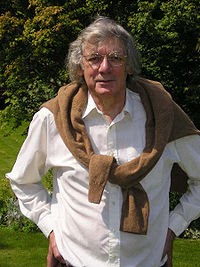PROFESSOR TED HONDERICH: LONDON UNIVERSITY COLLEGE…DEFENDS PALARAB TERROR AS “SELF DEFENSE”
http://daphneanson.blogspot.com/
A London Professor Defends Palestinian Terror
Edgar (“Ted”) Honderich (born 30 January 1933), formerly Grote Professor of Mind and Logic at UCL – no folks, he’s not Jewish – is the author of two post 9/11 books in which he assails Israel. He’s an arch-opponent of what he calls “neo-Zionism” – to describe Israel’s “expansionist” actions from 1967, it would seem – as witness an interview he gave to that anti-Zionist and increasingly antisemitic rag the Guardian (which needless to say lapped that word up) a few years ago http://www.guardian.co.uk/education/2005/mar/22/academicexperts.highereducationprofile – and is on record as saying:
“You could define ‘terrorism’ to pick out only and exactly Palestinian self-defence – which of course it also is – and hence use ‘non-terrorism’ to cover neo-Zionism. That would not commit you to condemning the first and justifying the second. My further and connected aspiration or hope is to contribute to the struggle against neo-Zionism, a struggle I regard as in a sense sacred….
I know full well, and have never doubted, the resolute rapacity of at least many leaders of the Jewish people from before 1948 to 1967 and of course after. That does not affect what is to me the fact that a certain project, a certain possible line of action, Zionism in my definition, was right in 1948, for certain reasons which include the Holocaust, and is right now, partly for the reason of the Jewish homeland that has come into existence. Maybe there are general questions in moral philosophy here, but I don’t quite see what they are. I am of course a consequentialist. That is, I judge the rightness of actions by their probable consequences. Maybe things become clearer when I allow that I think that I would in 1947 have supported actions of Ben Gurion, taking them as likely to forward Zionism in my sense, as distinct from neo-Zionism, even if I know his own intentions were otherwise, in fact rapacious….
My concern for and empathy with the Palestinians, as you will guess, is not small. My feeling for the Palestinians of 1948 is not slight. But the Jews in 1948 also existed. They could weep too. The plain necessity, more often admitted than stuck to, is to keep two sets of human facts in view. Certainly an injustice of terrible proportions — an inhumanity – was done to the Palestinians. Certainly Israel has not come within sight of compensating them. It has not done anything like what has been done by the Germans for the Jews for a related reason – the Holocaust.” http://www.stateofnature.org/tedHonderich.html
Emeritus Professor Honderich has written a letter to the Guardian (26 January) in the light of its publication of “The Palestine Papers”. Pontificates Honderich:
“The revelations in detail (Report, 25 January) of the intransigent greed, the escape from decency, of Israeli governments in negotiation with our selected leaders of the Palestinians, serve one purpose among others. They provide a further part of what is now an overwhelming argument for a certain proposition. It is that the Palestinians have a moral right to their terrorism within historic Palestine against neo-Zionism. The latter, neither Zionism nor of course Jewishness, is the taking from the Palestinians of at least their autonomy in the last one-fifth of their historic homeland. Terrorism, as in this case, can as exactly be self-defence, a freedom struggle, martyrdom, the conclusion of an argument based on true humanity, etc.”
Some mind. Some logic.
Read more:
http://www.guardian.co.uk/world/2011/jan/26/critics-should-respect-my-decision?INTCMP=SRCH
Comments are closed.

